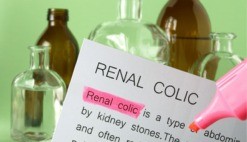 Renal Colic
Renal Colic
This is the pain caused by the passage of kidney stones through the urinary tract. When acute, renal colic has been described as ‘one of the strongest pain sensations felt by humans, being worse than childbirth, broken bones, gunshot wounds, burns, or surgery’.
What Causes Renal Colic?
Small kidney stones are often passed out painlessly in the urine, but a stone can easily block the narrower parts of the urinary system, such as the ureter (the tube connecting the kidney to the bladder) or the urethra (the tube through which urine passes out of the body).
The severe pain this causes in the side of your abdomen comes and goes in waves as the ureter squeezes the stone down towards the bladder or as the urethra tries to expel the stone. But renal colic may also present as a constant, dull ache. It may also spread down into the lower abdomen or groin, and be accompanied by sweating or nausea.
Treatment
Despite the extreme pain of renal colic and the upsetting sight of passing blood, blood clots, and pieces of the stone, most small stones are passed spontaneously, causing no permanent physical damage, and only pain killers are required.
Drink plenty of water to help wash the stone through, and if possible walk the stones out of the system for quicker relief. Otherwise, lying on the non-painful side and holding a hot water bottle or hot towel on the site of the pain may help.
Larger stones may need to be surgically removed. Read more at Kidney Stones
